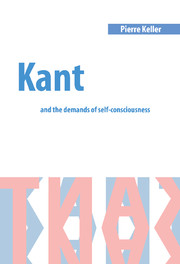Book contents
- Frontmatter
- Contents
- Acknowledgments
- 1 Introduction
- 2 Introducing apperception
- 3 Concepts, laws, and the recognition of objects
- 4 Self-consciousness and the demands of judgment in the B-Deduction
- 5 Self-consciousness and the unity of intuition: completing the B-Deduction
- 6 Time-consciousness in the Analogies
- 7 Causal laws
- 8 Self-consciousness and the pseudo-discipline of transcendental psychology
- 9 How independent is the self from its body?
- 10 The argument against idealism
- 11 Empirical realism and transcendental idealism
- Conclusion
- Notes
- Bibliography
- Index
3 - Concepts, laws, and the recognition of objects
Published online by Cambridge University Press: 22 September 2009
- Frontmatter
- Contents
- Acknowledgments
- 1 Introduction
- 2 Introducing apperception
- 3 Concepts, laws, and the recognition of objects
- 4 Self-consciousness and the demands of judgment in the B-Deduction
- 5 Self-consciousness and the unity of intuition: completing the B-Deduction
- 6 Time-consciousness in the Analogies
- 7 Causal laws
- 8 Self-consciousness and the pseudo-discipline of transcendental psychology
- 9 How independent is the self from its body?
- 10 The argument against idealism
- 11 Empirical realism and transcendental idealism
- Conclusion
- Notes
- Bibliography
- Index
Summary
I claimed in chapter two that Kant's notion of transcendental apperception involves a necessary representation of the numerical identity of the self. I also claimed that transcendental apperception is a capacity that Kant links to the conditions under which we could recognize any object of a representation. I want now to turn to Kant's argument to the conclusion that a necessary representation of numerical identity is required if we are to be able to recognize objects that are distinct from our representations. Kant not only argues that transcendental apperception and recognition of objects go together, he also argues that recognition of objects must be possible if we are to make sense of even the most minimal kind of discriminatory awareness. In this way, the argument becomes crucial not only to a defense of objectivity, but also to an understanding of the dependence of subjective on objective experience.
In the first section of this chapter, I take up Kant's so-called threefold synthesis of apprehension, reproduction, and recognition. Here, Kant first argues that any discriminatory awareness of what we experience involves the capacity to connect different temporal perspectives together. He then argues that this requires the ability to associate items that we experience at one time with items that we experience at another time. Such associations in turn require the existence of objects that are distinct from what we experience from the vantage-point of any given temporal perspective.
Information
- Type
- Chapter
- Information
- Kant and the Demands of Self-Consciousness , pp. 45 - 64Publisher: Cambridge University PressPrint publication year: 1999
